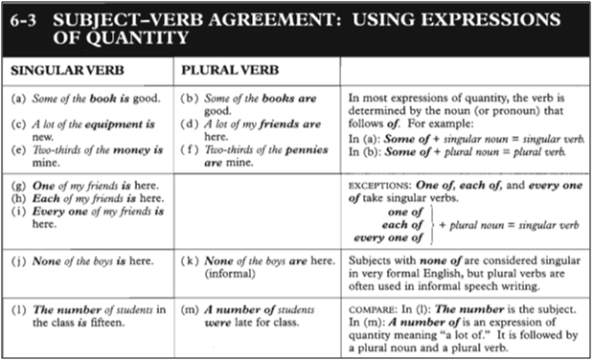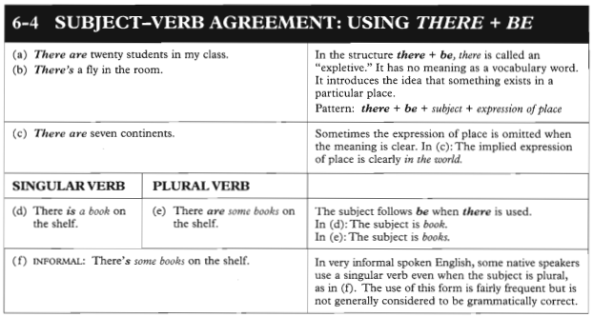SUBJECT AND VERB AGREEMENT
BASIC RULE:
The basic rule states that a singular subject takes a singular verb, while a plural subject takes a plural verb.
RULE 1
Two singular subjects connected by or or nor require a singular verb.
EXAMPLES:
*Brenda or Marisol talks about this topic.
* M y dog or my cat is eating my hamburger right now.
* My father or my mother is cooking the dinner.
*My brother or my sister is cleaning the garden.
RULE 2:
Two singular subjects connected by either or neither require a singular verb as in rule 1.
EXAMPLES:
*Neither my brother nor my sister cleans the garden.
*Neither the doctor nor the nurse takes care of mu grand father.
*Either my English teacher or Mathematic teacher talks about the exam.
*Either Diego or E rick does the homework.
RULE 3:
When is one of the two subjects connected by either/or or neither/nor, put it second and follow it with a singular verb am.
EXAMPLES:
*Neither he or I am doing the homework.
*Either Blanca or I am going to the beach.
*Either she or I am playing the guitar.
RULE 4:
When a singular subject is connected by or or nor to a plural subject, put the plural subject las and use a plural verb.
EXAMPLES:
*The watermelon or the oranges help to prevent the flu.
*The banana or the apples clean the teeth.
*The suggar or the eggs go in this recipient.
RULE 5
When a singular and plural subject are connected by either/or or neither/nor, put the plural subject last and use a plural verb.
EXAMPLE:
*Neither the teacher nor the the students are angry with you.
*Either the nurse or the doctors are bussy.
*Neither Cristobal nor the others do his homework.
RULE 6:
As a general rule, use plural verb with two or more subjects when they are connected by and.
EAMPLES:
*Karen and Douglas are very intelligent.
*An apple and an orange are good for your health.
*Rodrigo and Julio are best friends.
*The doctor and teh nurse are hard workers.
RULE 7
Sometimes the suject is separated from the verb by words such as along, as well, besides, or not. Ignore these expression when determining whether to use a singular or plural verb.
EXAMPLES
*The teacher along with the student, is working hard.
*Doing exercises as well eating halthy food, is very important for your life.
RULE 8
The pronouns each, everyone, everybody, anyone, anybody, someone, somebody are singular and require a singular verbs. Do not be misled by what follows of.
EXAMPLES
*Somebody sings that beautiful song.
*I do not know if anybody talks about the legend.
*I know something about history.
*I know nothing about American Culture.
Nobody brings the homework.
RULE 9
With words that indicate portions, percent, fraction, part, majority, some, all, none, remainder, and so forth, look at the the noun in your of phrase to determinate whether to use a singular or plural vrb. If the object of the preposition is singular, use a singulae verb. If the object of the preposition is plural use a plural verb.
EXAMPLES
*Twenty percent of Salavdorians are ready for the elections.
*Twenty percent of Salavadorianis working on bad conditios,
*One third of the people are studying at the university.

RUlE 10
The expression the number is followed by a singular verb while the expression a number is followed by a plural verb.
EXAMPLES
*The number of electos that we need is very high.
*The number of students is highest than other years.
*A number of people that are in the university are high this year.

RULE 11
When either and neither are subject, they always take singular verb.
EXAMPLES
*Neither of you is ready for the exam.
*Neither of students is understanding my class.
*Either of them is making a phone call.
*Either of us is talking in the class.
RULE 12
The words here and there have generally been labeled as adverbs even thoung they indicate place. In sentences beginnning with here or there, the subject follow the verb.
EXAMPLES
*There is a beutiful church.
*There is a wonderful park.
*There are three buildings that lok interesting.
*There are different types of students.

RULE 13
Use a singular verb with sums of money or periods of time.
EXAMPLES
*Five years is the time that she needs for her graduation.
*Seven years is enough time to finish the building.
RULE 14
Sometimes the pronoun who, that or which is the subject of a verb in the middle of the sentence. The pronoun who, that and which become singular or plural according to the noun directly in front of them.
EXAMPLES
*My father is a person who enjoys helping people.
*The doctor is someone who helps other people.
*A nurse is someone who takes care of people.
*He is one the nurses who takes care of my faher.
*They are a group of people that are very intelligent.

RULE 15
Collective nouns such as team and staff may de either singular or plural depending on their use in the sentence.
EXAMPLES
*The staff is taking a lunch.
*Staff is doing a very good job.
*The staff members are in problems with their boss.
The club members are in disagreement with their boss.
Sometimes the suject is separated from the verb by words such as along, as well, besides, or not. Ignore these expression when determining whether to use a singular or plural verb.
EXAMPLES
*The teacher along with the student, is working hard.
*Doing exercises as well eating halthy food, is very important for your life.
RULE 8
The pronouns each, everyone, everybody, anyone, anybody, someone, somebody are singular and require a singular verbs. Do not be misled by what follows of.
EXAMPLES
*Somebody sings that beautiful song.
*I do not know if anybody talks about the legend.
*I know something about history.
*I know nothing about American Culture.
Nobody brings the homework.
RULE 9
With words that indicate portions, percent, fraction, part, majority, some, all, none, remainder, and so forth, look at the the noun in your of phrase to determinate whether to use a singular or plural vrb. If the object of the preposition is singular, use a singulae verb. If the object of the preposition is plural use a plural verb.
EXAMPLES
*Twenty percent of Salavdorians are ready for the elections.
*Twenty percent of Salavadorianis working on bad conditios,
*One third of the people are studying at the university.

RUlE 10
The expression the number is followed by a singular verb while the expression a number is followed by a plural verb.
EXAMPLES
*The number of electos that we need is very high.
*The number of students is highest than other years.
*A number of people that are in the university are high this year.

RULE 11
When either and neither are subject, they always take singular verb.
EXAMPLES
*Neither of you is ready for the exam.
*Neither of students is understanding my class.
*Either of them is making a phone call.
*Either of us is talking in the class.
RULE 12
The words here and there have generally been labeled as adverbs even thoung they indicate place. In sentences beginnning with here or there, the subject follow the verb.
EXAMPLES
*There is a beutiful church.
*There is a wonderful park.
*There are three buildings that lok interesting.
*There are different types of students.

RULE 13
Use a singular verb with sums of money or periods of time.
EXAMPLES
*Five years is the time that she needs for her graduation.
*Seven years is enough time to finish the building.
RULE 14
Sometimes the pronoun who, that or which is the subject of a verb in the middle of the sentence. The pronoun who, that and which become singular or plural according to the noun directly in front of them.
EXAMPLES
*My father is a person who enjoys helping people.
*The doctor is someone who helps other people.
*A nurse is someone who takes care of people.
*He is one the nurses who takes care of my faher.
*They are a group of people that are very intelligent.

RULE 15
Collective nouns such as team and staff may de either singular or plural depending on their use in the sentence.
EXAMPLES
*The staff is taking a lunch.
*Staff is doing a very good job.
*The staff members are in problems with their boss.
The club members are in disagreement with their boss.

No hay comentarios:
Publicar un comentario